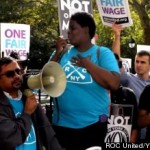McDonald’s Complaint Redefines The Meaning Of “Employee”

Mike Blake / Reuters
They wear the company’s logo on their shirt, but does a worker at a franchised McDonald’s restaurant really work for the McDonald’s corporation?
It’s a big, important legal question with huge ramifications for the company and its industry, and today rhe National Labor Relations Board dived further into thet debate, releasing a complaint against McDonald’s that declared the company a “joint employer” of the workers in its franchises, and at least partially responsible for their treatment.
An administrative judge’s ruling on the complaint in the weeks to come will likely set a precedent for companies that operate under the franchise model, and determine their level of responsibility when it comes to their employees. Franchisees own about 90% of the 14,000 McDonald’s restaurants in the U.S.
The decision, if it affirms the NLRB’s claim, would hit home particularly hard in the restaurant industry, which employs nearly 10% of the U.S. workforce. Restaurants are the country’s second largest private sector employer, and have been one of the largest creators of new jobs since the recession.
The NLRB believes that McDonald’s as a corporation and its franchisees are joint employers of the people who work at the fast food chain, and should therefore both be held accountable for any employee rights violations. The complaint released today alleges certain employees were persecuted for advocating for higher wages.
Some McDonald’s employees have been at the forefront of a national campaign to raise the minimum wage, and the NLRB complaint says they experienced retaliation from their employers over the activism.
In a statement, the NLRB said its complaint alleges “that McDonald’s USA, LLC and certain franchisees violated the rights of employees working at McDonald’s restaurants at various locations around the country by, among other things, making statements and taking actions against them for engaging in activities aimed at improving their wages and working conditions, including participating in nationwide fast food worker protests about their terms and conditions of employment during the past two years.”
McDonald’s spokeswoman Lisa McComb said the NLRB’s actions “improperly and dramatically strike at the heart of the franchise system – a system that creates economic opportunity, jobs and income for thousands of business owners and their employees across the country.” The company will contest both the designation as a “joint employer” and the underlying allegations, she said.
More vocal opposition to the NLRB coming from the U.S. Chamber of Commerce, the National Restaurant Association, the National Retail Federation, and the International Franchise Association, which held a joint call shortly after the complaint’s release to express their objection to the NLRB’s claim that McDonald’s can be seen as an employer of workers in its franchises.
“It’s a sad day,” Angelo Amador, Vice President & Regulatory Counsel at the National Restaurant Association said on the call. “It’s going to upend the franchise model and resolutions to do business in the economy.”
The IFA’s Executive Vice President, Government Relations & Public Policy Robert Cresanti was the most critical of the NLRB’s statement, as well as the timing of the move.
“For us this is the nightmare before Christmas,” Cresanti said. “A group of non-elected bureaucrats have joined up with the unions while Congress has left for the holidays, it’s a devastating blow.”
When pressed by media listening in on the call for specific examples of how the NLRB’s complaint would negatively affect franchisees, as Cresanti also alleged over the course of the 45-minute call, Cresanti said it would limit their control of employees.
“This pierces the corporate entity of the small business owner in an attempt to go into a national chain,” Cresant said. “It creates uncertainty and increased risk for franchisors. There are significant threats that pile on as a result of that. It takes away franchisees’ control to operate independently.”
The IFA’s Labor Counsel, Michael Lotito, added it is prohibitively expensive for franchisees to do battle with the NLRB in court, and said today’s complaint “is part of a corporate campaign to put pressure on the franchisor by constantly attacking the franchisees”
Franchisees “have to hire counsel when faced with a complaint and do not have the resources to undertake this kind of fight,” he said. “The franchisees are at a tremendous disadvantage to figure out these complex rules and regulations.”
Sourced from buzzfeed.com

























Recent Comments